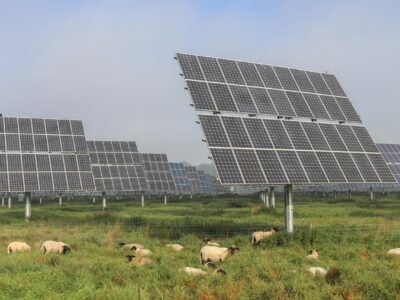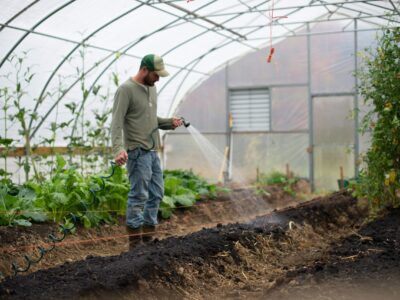Believe it or not, traditional farming practices aren’t natural. Farmers are beginning to realize that endless rows of a single crop over acres of farmland are too homogenous, too tidy, and frankly, too neat for natural processes to work continuously uninhibited. These monoculture practices require a precarious balance to have successful growing seasons year after year. Nowadays, farmers are leaving these monoculture practices for regenerative farming practices that promote plentiful harvests without threatening soil health or longevity.
Nicholas DiDomenico, owner of Elk Run Farm, knows this as well as anyone. His farm is a thriving agricultural oasis in the middle of the arid desert of Boulder, Colorado. However, it wasn’t always so lush. When he bought the property in 2015, it was an overgrazed plot of land used primarily for the storage of heavy farming equipment. Inspired by regenerative farming practices, he made it his mission to nurse the soil back to health.
The process of bringing life back to the soil was arduous. Over two years, he introduced pigs to the land, and spread wood chips, straw and other organic materials on the earth, in order to aerate the soil and help restore and retain nutrients.
The biggest difficulty in making the farm viable was the lack of supplemental irrigation. The only sources of water on the farm are rainwater and a productive well, making it incredibly difficult to have a successful growing season. DiDomenico’s solution was to plant trees as a way for the soil to retain water, as well as a way to direct rainwater towards the crops using a contour farming system.
“The way that we see it, the trees are really anchoring the ecosystem,” said DiDomenico. The decision to plant trees as a way of making his farm viable ultimately became his introduction to agroforestry, and eventually a successful farm.
Comparing his farm now to where it was in 2015, the differences are immense. His land is much less a farm and more of a self-sustaining agroforestry ecosystem. DiDomenico runs his farm based on the niche regenerative practice known as permaculture. It’s a way of farming the land that works in harmony with nature instead of the traditional farming practices that push the land to its limit year after year and squeeze every last ounce of nutrients from the soil. Despite the limited resources he’s working with, his farm is a testament to the power of permaculture and regenerative agriculture. “This system is inherently demonstrative because, as far as we know, nobody has tried to grow an agroforestry system in this dry of a climate without extra water,” DiDomenico said. “So, whatever does well here is going to be the foundation.”
The farm is incredibly productive. DiDomenico grows everything from peppers, corn, and leeks, and provides 90% of the calories for the team who lives on the property. It also provides for the livestock they cultivate. When the growing season is over they bring chickens, hogs, and sheep to graze and clear the land, preparing the land for the next growing season while nourishing the livestock.
After seeing the success with Elk Run Farms, DiDomenico and his partner Marisa Pulaski wanted to share their success with their community. They started a nonprofit organization called the Drylands Agroecology Research that researches regenerative agricultural practices that focus on water management, efficient ecological design, earthworks, and proper animal management to create a harmonious agricultural ecosystem that restores the natural health of the land and prepares it for successful and sustainable agricultural use.
DiDomenico and Pulaski also started the Foothills Farm Collective. The collective partners with other farms in the area that focus on regenerative practices as a way to build a community around regenerative agriculture. “By being able to have a platform that is both utilizing these regenerative practices and bringing in others to be able to showcase what they’re working on, we can actually start creating more of this localized economy,” says Azuraye Wycoff, managing director of Yellow Barn Farm, one of the farms involved in the collective.
For DiDomenico and his team, their farm is not just about a successful harvest, it’s about the ideas that got them there and about spreading those ideas to their community to share in the success. “My hope is that there’s this new generation of younger farmers that are innovative and inspired by the idea that we need to make a difference ecologically, who will use these regenerative farming techniques to do that,” DiDomenico says. And with all the work he and his team have done for the farm and for the regenerative agricultural community, his vision is quickly becoming a reality.





